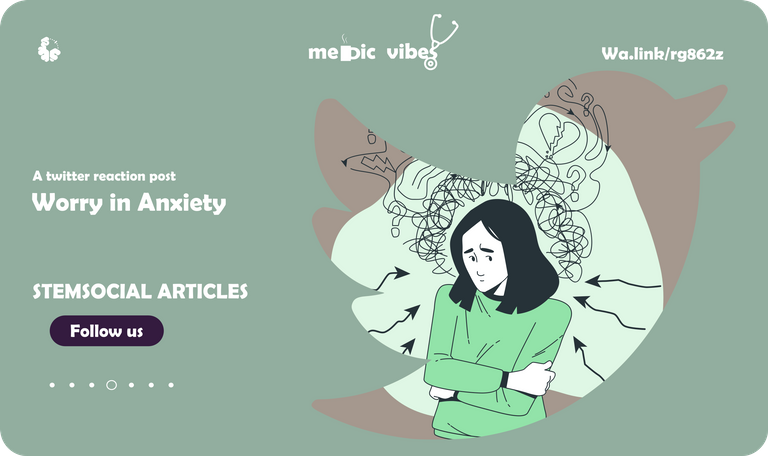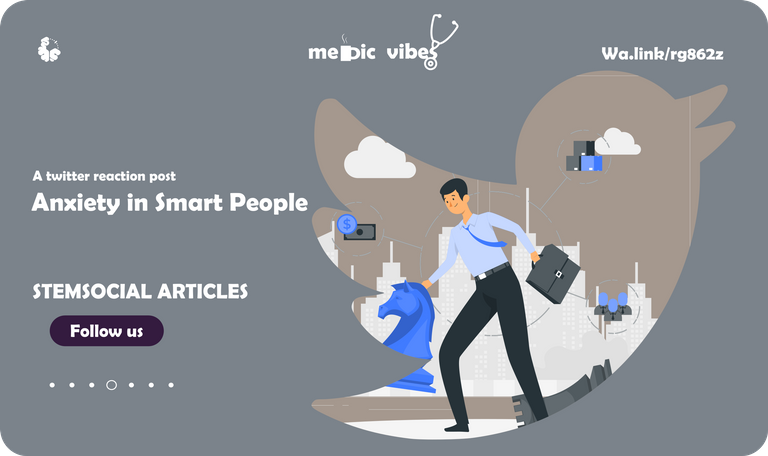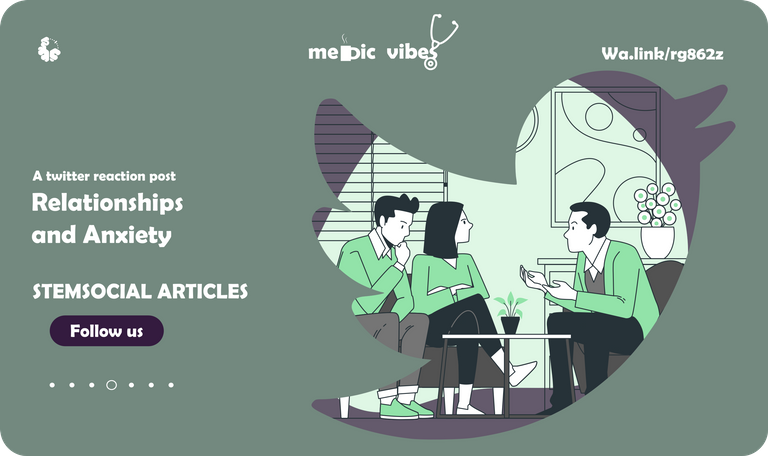Worry in Anxiety (A Twitter Reaction Post)

Depression vector created by pch.vector - www.freepik.com and Inkscape.org
one of the most relatable things about anxiety that taylor swift has ever written pic.twitter.com/V7ah5iqcvu
— veronica (@soitfuckingoes) September 13, 2022
In the last post, we discussed anxiety in smart people and we tried to confirm if really people with high IQs tend to have anxiety, but in addition, we were able to see that they suffered from other psychological problems. The study we looked at included those from a workplace that only employed people with an IQ score of 130 and above.

Depression vector created by pch.vector - www.freepik.com and Inkscape.org
Smarter people are more likely to suffer from anxiety and depression.
— Fact (@Fact) September 14, 2022
In this post, we want to look at the worry in anxiety. According to the Twitter post which quoted a Taylor Swift song, there was a description of insomnia and ruminating thoughts. How bad can it get in anxiety? In our post, we have explained severally how those with anxiety tend to be bothered.
Your anxiety won’t ruin your relationship with the right person. remember that.
— feelings (@sadtruthwords) September 12, 2022

Depression vector created by pch.vector - www.freepik.com and Inkscape.org
This is the Medic Vibes blog, where we assist one another in staying informed about topics about mental health. Hello and welcome, and I hope you are enjoying your day. The blog's host, @ebingo, is a doctor and an illustrator. We haven't yet switched to our main blog because there is only one writer and illustrator on staff at the moment. We are currently blogging for the STEMsocial community. Last month we talked about depression, and this month is all about anxiety. Similar to this month, we started last month with a study from Nigeria that showed anxiety was 50% common in a youth camp. Following the study last month, we started looking at Twitter posts, and we are still doing so.
Anxiety disorders are mental health conditions that cause elevated levels of fear and worry. Even though most people are susceptible, this condition is more likely to affect the younger generation.
We found, for instance, that almost 50% of campers in Northwest Nigeria experienced anxiety. However, only about 3% of people worldwide and 1% of all Nigerians as a whole report having anxiety. It is more likely to affect women.
Before significant exams, presentations, or performances, everyone has at some point in their lives experienced heart palpitations. But what if I told you that some people go through that emotion every day? People with social anxiety disorder are preoccupied with what others will think of them. They might encounter one of these individuals every day, such as a boss or a coworker. People will thus employ avoidance techniques. In one of our earlier posts, we looked at how social anxiety in people can show up during phone calls.
In anxious people, physical, psychological, and reactionary symptoms are all present.
Chest pain, stomach pain, weakness, rapid breathing, and a rapid heartbeat are a few examples of physical symptoms. These are frequently caused by the autonomic system's sympathetic firing.
Insomnia, nightmares, and flashbacks are a few of the psychological symptoms of anxiety.
Avoidance is one of the reactionary symptoms that can occur with both social anxiety and post-traumatic stress disorder.
According to the diagnostic and statistical manual, each subject has a unique root cause of anxiety that lasts longer than six months. Keeping it under control can be difficult. Physical symptoms in children with anxiety include pain, fatigue, jitteriness, and sleep issues, one of which is always present.
Risk Factors
With Anxiety disorders, when it comes to who can suffer from the condition, it is a little bit of genetics and a little bit of the environment.
Being shy, tending to avoid meeting new people, or avoiding specific locations are all behavioural characteristics that increase a person's likelihood of experiencing anxiety.
Additionally, experiencing traumatic or extremely stressful events as a child increases one's risk of developing anxiety.
A person is also at risk if they have relatives who suffer from anxiety disorders.
Some medical conditions, such as thyroid issues and heart conditions like arrhythmias, increase a person's risk of developing anxiety disorders.
The likelihood that you will experience anxiety is generally higher if you are a woman. Some researchers think this is because of the hormonal changes that occur during the monthly menstrual cycle, while others think that higher testosterone levels have a calming effect. Some believe that women are less likely to receive anxiety therapy.
It is important to keep an eye out for any changes as soon as they appear because depression and anxiety are related and because depression increases a person's risk of suicide.
Worry in Anxiety

Home illustrations by Storyset
To write this post I had to ignore posts that had to do with worry and anxiety. So those were posts from Henry ford and intermountain healthcare.
NIMH discusses in their post about Generalised Anxiety Disorder (GAD )how the worry in this disorder can get out of control. The Title of the post is
Generalized Anxiety Disorder: When Worry Gets Out of Control
In GAD the patient is in a constant state of worry. Understanding just how much of this worry is normal and how bad it can get can be very important for the early detection and treatment of the condition.
The symptoms usually start to show around the age of 30, and they include:
Excessive worry, an inability to control the worry experienced, a knowledge of the irrationality of the worry. In addition to the worry, there is also trouble going to bed, paying attention, and the patient is easily frightened.
It is more common in women. When it happens to children and teenagers, their worry is centred around sports activities, unforeseen war or disaster or the health of a loved one in the family.
GAD is precipitated by stressful situations but it can run in families.
Tips

People illustrations by Storyset
The psychotherapy options for GAD are Cognitive Behavioural Therapy (CBT) and Acceptance and Commitment Therapy (ACT). The first step is usually to get a diagnosis from a health professional. In CBT the psychological modifications are in thinking, behaviour and reactions while ACT is more about mindfulness and goal setting. CBT has more proof of its effectiveness and ACT is a newer form of treatment.
The medication usually prescribed for this condition is usually antidepressants such as Selective Serotonin Reuptake inhibitors or Antianxiety medication such as Benzodiazepines or a combination of the two.
Hive stories
@akida shows the true beauty of art as it is explained that the alien artwork is inspired by research work on anxiety. I would love to invite @akida to check out some of our posts so they can build more inspiration. Thank you for bringing colour to the topic with your art.
Check out the creation process here
Questions
- What did you learn about GAD?
- What did you learn about worrying in GAD?
Conclusion
People with GAD can have symptoms of anxiety, especially worrying that are far from normal. Treating this condition can include psychotherapy and pharmacotherapy.
I hope that you learned a lot from this post.
To book me for illustration gigs click Here
Wow, you made a great post or should I better say article? Thanks for inviting me. Have to check out more posts about that and more articles feom you I think. Muito muito obrigada my dear friend @ebingo 🙏🏼🤗🎨
I do a little bit of art myself...nothing like what you have going on though...Thank you for honouring my mention with your presence. Let me know if you see more posts you like and can build inspiration from.
Have an amazing day..
Cool. Maybe you show us more of you art even? Would love to see more. No thanks needed, or better, thanks back to ya always. 👍🏼😊🙏🏼
If i see some i let you know.
Have a great weekend my dear.
🤗🤗
🤗🙏🏼💕💯🎨
Thanks for your contribution to the STEMsocial community. Feel free to join us on discord to get to know the rest of us!
Please consider delegating to the @stemsocial account (85% of the curation rewards are returned).
You may also include @stemsocial as a beneficiary of the rewards of this post to get a stronger support.